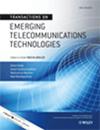Optimal, heuristic and Q-learning based DSA policies for cellular networks with coordinated access band
引用次数: 6
Abstract
Due to the increasing demands for higher data rate applications, also due to the actual spectrum crowd situation, Dynamic Spectrum Access (DSA) turned into an active research topic. In this paper, we analyse DSA in cellular networks context, where a Coordinated Access Band (CAB) is shared between Radio Access Networks (RANs). We propose a Semi-Markov Decision Process (SMDP) approach to derive the optimal DSA policies in terms of operator reward. In order to overcome the limitations induced by optimal policy implementation, we also propose two simple, though sub-optimal, DSA algorithms: a Q-learning (QL) based algorithm and a heuristic algorithm. The achieved reward using the latter is shown to be very close to the optimal case and thus to significantly exceed the reward obtained with Fixed Spectrum Access (FSA). The rewards achieved by using the QL-based algorithm are shown to exceed those obtained by using FSA. Higher rewards and better spectrum utilisation with DSA optimal and heuristic methods are, however, obtained at the price of a reduced average user throughput. Copyright © 2010 John Wiley & Sons, Ltd.具有协调访问频带的蜂窝网络的最优启发式和基于q学习的DSA策略
由于对更高数据速率应用的需求不断增加,以及频谱拥挤的实际情况,动态频谱接入(Dynamic spectrum Access, DSA)成为一个活跃的研究课题。在本文中,我们分析了在无线接入网(ran)之间共享协调接入频带(CAB)的蜂窝网络环境下的DSA。我们提出了一种半马尔可夫决策过程(SMDP)方法,从操作员奖励的角度推导出最优的DSA策略。为了克服最优策略实现所带来的限制,我们还提出了两种简单但次优的DSA算法:基于Q-learning (QL)的算法和启发式算法。使用后者获得的奖励显示非常接近最优情况,因此大大超过使用固定频谱接入(FSA)获得的奖励。结果表明,使用基于sql的算法获得的奖励超过使用FSA获得的奖励。然而,使用DSA最优和启发式方法获得更高的回报和更好的频谱利用率是以降低平均用户吞吐量为代价的。版权所有©2010 John Wiley & Sons, Ltd
本文章由计算机程序翻译,如有差异,请以英文原文为准。
求助全文
约1分钟内获得全文
求助全文

 求助内容:
求助内容: 应助结果提醒方式:
应助结果提醒方式:


